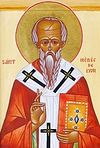

| Previous day | Next day |
| Old Style
August 23
|
Saturday |
New Style
September 5
|
| 13th Week after Pentecost. Tone 3. | No fast.
|
![]() Apodosis of the Dormition.
Apodosis of the Dormition. ![]() Martyr Lupus, slave of St. Demetrius of Thessalonica (306).
Martyr Lupus, slave of St. Demetrius of Thessalonica (306).
Hieromartyr Irenaeus, bishop of Lyons (202). Sts. Eutychius (ca. 540) and Florentius (547) of Nursia. St. Callinicus, patriarch of Constantinople (705).
New Hieromartyrs Ephraim (Kuznetsov), bishop of Selenginsk, and John Vostorgov, archpriest, of Moscow, and Martyr Nicholas Varzhansky (1918).
Hieromartyr Pothinus, bishop of Lyons (ca. 177). Martyrs Severus, Memnon the Centurion, and 38 others, of Thrace (ca. 305). Ebba the Younger, abbess, of Coldingham, Northumbria, and her companions (870). St. Anthony, bishop of Sardis (10th c.). St. Nicholas the Sicilian, who struggled on Mt. Neotaka in Euboea.
Repose of Abbot Ioannicius (Moroi) of Sihastria, Romania (1944).
Thoughts for Each Day of the Year
According to the Daily Church Readings from the Word of God
By St. Theophan the Recluse

Saturday. [I Cor. 2:6-9; Matt. 22:15-22]
Render unto Caesar the things which are Caesar’s; and unto God the things that are God’s—render unto each person what is his. From here comes a law: do not please God in one way alone, but in whatever way you can and ought to please Him; direct all of your strength and every means toward serving God. Having said render unto Caesar the things which are Caesar’s, the Lord showed that such work is pleasing to Him. If by the things which are Caesar’s you understand all routines of earthly life in general which are necessary and essential, and by the things that are God’s all routines of the Church established by God, then from here it turns out that all the paths of our life are filled with ways for salvation. Just take heed and use everything, and act everywhere in accordance with God’s will, as God wants from you—and salvation for you is at hand. You can set yourself so that not a single step is taken without a deed pleasing to God, and consequently, a step toward salvation, for the path of salvation proceeds along the path of God’s will. Walk in God’s presence, take heed, discern, and set immediately without self-pity to that deed which your conscience shows you at each given moment.



